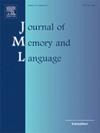Individual differences and 11-year longitudinal changes in older adults’ prospective memory: A comparison with episodic memory, working memory, processing speed, and verbal knowledge
IF 3
1区 心理学
Q1 LINGUISTICS
引用次数: 0
Abstract
Prospective Memory (PM; remembering intended actions after a delay) represents a core ability contributing to everyday functioning and independence in older adulthood. Despite its high relevance for successful aging, the understanding of individual differences in level and within-person change of PM in older adulthood is currently limited. Using longitudinal data from initially 364 older adults (between 65 and 80 years of age at wave 1; 46 % female) across four waves of the Zurich Longitudinal Study on Cognitive Aging, we examined (a) individual differences and (b) longitudinal change in PM performance over up to 11 years, (c) compared differences and change in PM with other central variables of cognitive functioning (episodic memory, working memory, processing speed, verbal knowledge), and (d) explored the effect of key sociodemographic variables (education, income, sex, health) on PM. Linear mixed modeling with Bayesian estimation indicated substantial individual differences in cognitive performance, with by far the highest variability in PM. Longitudinal age-related decreases were largest for working memory and cognitive speed, relatively small for PM, while verbal knowledge remained stable. Individual differences in age-related changes in performance were only observed for processing speed and verbal knowledge, but not for PM. This pattern remained after considering various cognitive and sociodemographic covariates. This is the first longitudinal study of PM that allows an in-depth examination of individual differences in both level and change in PM with comparison to other key cognitive abilities across older adulthood. The findings highlight the complex interplay between cognitive abilities, individual differences, and development across older adulthood, with implications for understanding cognitive aging.
老年人前瞻记忆的个体差异和11年纵向变化:与情景记忆、工作记忆、加工速度和言语知识的比较
前瞻记忆;在延迟后记住预期的动作)是一种有助于老年人日常运作和独立的核心能力。尽管PM与成功衰老有很高的相关性,但目前对老年人PM水平和体内变化的个体差异的理解有限。使用最初364名老年人的纵向数据(第一波65 - 80岁;在苏黎世认知衰老纵向研究的四波中,我们检查了(a)个体差异和(b)长达11年的PM表现的纵向变化,(c)比较PM与认知功能的其他中心变量(情景记忆、工作记忆、处理速度、言语知识)的差异和变化,以及(d)探索关键社会人口变量(教育、收入、性别、健康)对PM的影响。贝叶斯估计的线性混合模型表明认知表现存在显著的个体差异,到目前为止,PM的可变性最大。纵向年龄相关的下降最大的是工作记忆和认知速度,相对较小的是PM,而口头知识保持稳定。年龄相关表现变化的个体差异仅在处理速度和语言知识方面观察到,而在PM方面没有观察到。在考虑了各种认知和社会人口协变量后,这种模式仍然存在。这是第一次对PM的纵向研究,可以深入检查PM水平和变化的个体差异,并与老年人的其他关键认知能力进行比较。这些发现强调了认知能力、个体差异和老年人发展之间复杂的相互作用,对理解认知衰老具有启示意义。
本文章由计算机程序翻译,如有差异,请以英文原文为准。
求助全文
约1分钟内获得全文
求助全文
来源期刊
CiteScore
8.70
自引率
14.00%
发文量
49
审稿时长
12.7 weeks
期刊介绍:
Articles in the Journal of Memory and Language contribute to the formulation of scientific issues and theories in the areas of memory, language comprehension and production, and cognitive processes. Special emphasis is given to research articles that provide new theoretical insights based on a carefully laid empirical foundation. The journal generally favors articles that provide multiple experiments. In addition, significant theoretical papers without new experimental findings may be published.
The Journal of Memory and Language is a valuable tool for cognitive scientists, including psychologists, linguists, and others interested in memory and learning, language, reading, and speech.
Research Areas include:
• Topics that illuminate aspects of memory or language processing
• Linguistics
• Neuropsychology.

 求助内容:
求助内容: 应助结果提醒方式:
应助结果提醒方式:


